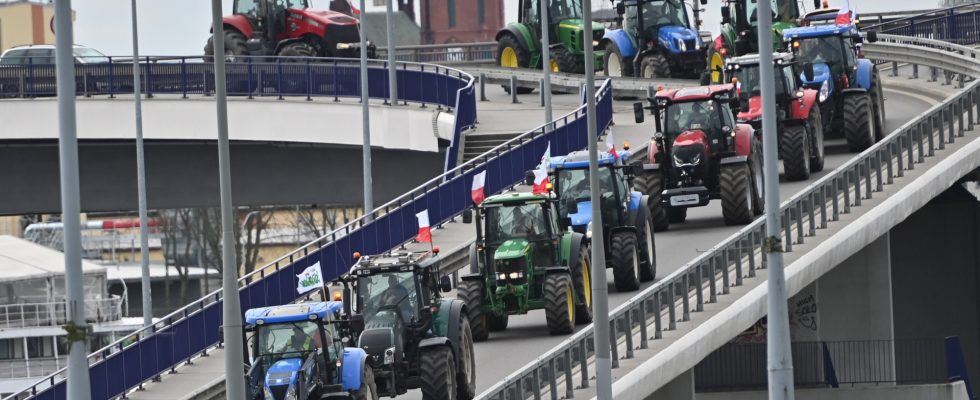Europe magazine
As of: 04/15/2023 9:03 p.m
Ukrainian grain, exported to Africa via Poland – this mechanism has been causing protests from Polish farmers for weeks. Now the government stopped imports – but the farmers remain skeptical.
Farmer Marcin Furtak stands in front of a large mountain of his wheat and is angry. Actually, his warehouse should be empty now, the wheat sells. But of the 140 tons harvested last year, there are still 60 tons that he either cannot sell at all or can only sell at a ridiculous price.
“A reasonable price would be at least 1,400 zloty per tonne, but at the moment prices are between 750 and 800 zloty. I can’t cover my costs with that and I’m certainly not making a profit,” says the 40-year-old.
His farm in the village of Kulakowice Drugie in the south-eastern tip of Poland is on the verge of collapse if things continue like this.
Poland’s farmers protest against imports of Ukrainian grain
Kristin Joachim, ARD Warsaw, Europamagazin, April 15, 2023
Help that works differently than planned
The reason for the fall in prices are massive cheap grain imports from Ukraine. What was actually intended as help for the neighboring country turns out to be a catastrophe for the Polish farmers.
Because of the war in Ukraine, the options for exporting grain across the Black Sea are limited, and some have to leave the country by other routes. The EU therefore set up a solidarity corridor last year, i.e. abolished tariffs on imports into the EU, assuming that the grain transits through the EU countries and then ends up in its destination countries in Africa.
But contrary to what was planned, the grain is getting stuck in the Eastern European countries and especially in Poland. For Polish farmers, this means that there is suddenly an oversupply of corn and other grains on their sales market and they can no longer sell their goods – while the price of food in Poland is also rising steadily with an inflation rate of a good 18 percent.
The farmers call for tariffs
That’s why farmers in Poland have been protesting in various places across the country for the past three weeks. Here in the area around Kulakowice Drugie, right on the border with Ukraine, Marcin Furtak and the farmers want to block the border crossing for freight trains with their tractors.
Their anger is not directed against the Ukrainians, but against the Polish government and the EU. “We want tariffs! And we want the ports to finally be expanded so that the goods that come to Poland can go out again,” says Michal Kolodziejczak.
Because one of the reasons why Ukrainian grain stays in the country is the lack of capacity in the ports of Szczecin or Gdansk.
The Ukrainian grain should actually be shipped from here to the destination ports in Africa. But the ports are already operating at their capacity limits.
Bought cheap, resold expensive
Another reason, as farmer Kolodziejczak describes it, is that Polish grain dealers buy cheaper grain from the Ukraine and sell it here in Poland as Polish grain at a higher price.
But the Ukrainian grain often does not meet EU quality standards and is contaminated with pesticides that are banned here in the EU.
Blockades also in the northwest
At the same time as the farmers in the south-east of Poland, others are protesting in the north-west, in Szczecin. You are blocking a roundabout in the port city. The new Minister of Agriculture, Robert Telus, is here and wants to talk. He has only just taken office after his predecessor Henryk Kowalczyk resigned in early April.
Telus emphasizes that he is a farmer himself, so he understands the problems well and refers to an agreement reached by Polish Prime Minister Mateusz Morawiecki and Ukrainian President Volodymyr Zelenskiy last week during his visit to Poland.
According to this, a large part of grain exports from Ukraine should be stopped for the time being by June. A corresponding written agreement is to be signed next Monday. In addition, an investigative commission is to investigate possible cases of fraud in the declaration of Ukrainian grain as Polish.
Government plans changes
At a party conference of the ruling Law and Justice PiS party, its leader Jaroslaw Kaczynski also announced that the government had passed a decree that with immediate effect Ukrainian grain and other foodstuffs could no longer be imported across the border into Poland. Talks on the grain issue will begin with the Ukrainian side. In addition, the government wants to buy the grain still in the farmers’ warehouses at a minimum price of 1,400 zlotys per ton.
But Polish farmers are skeptical. They intend to continue their protests until their situation noticeably improves.
You can see this and other reports in Europamagazin – on Sunday at 12.45 p.m. in the first.

